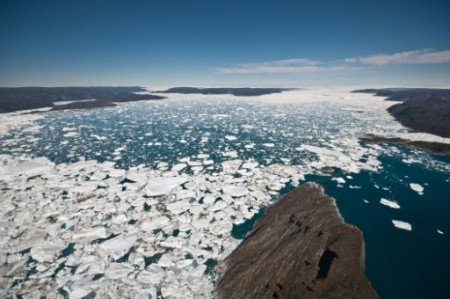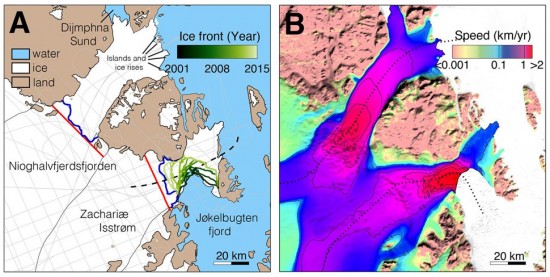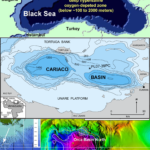November 19, 2015 – We may have to wait until quantum computers are widely available before we will have the kind of climate models that produce simulations that match actual climate here on Earth. I’m not the only one of this opinion. Just this last week research published in the November 12, 2015 online edition of Science, showed that once again climate models are not robust enough to reflect reality.
In this particular case, Zachariae Isstrom (seen in Image A and B below). A significant northeast Greenland glacier, containing enough water to raise global sea levels by 0.5 meters (19.5 inches), suddenly tripled its velocity and destabilized the ice shelf holding it back from falling into the ocean. A neighbouring glacier was also similarly impacted and although the paper doesn’t provide ice volume calculations for it, you can bet that its melt water would drive ocean levels even higher. Warmer air over the Arctic and warmer ocean temperatures were blamed.
The operative word of this study is “unexpected.” No climate model predicted that this scenario was likely to play out. And yet we approach a global climate change agreement predicated on evidence-based reasoning with models that remain deficient in delivering accurate prognostications.
Of course this is the wedge that some American politicians, and executives of major oil companies use to denigrate climate science and its predictions of a rise in atmospheric temperatures and sea levels that will endanger much of humanity.
What these executives and politicians fail to realize is that the evidence discovered from thousands of deployed sensors and data recorders is indicating even much worse results than climate simulations predict. One wonders if our leadership in the political and business world would be more proactive about climate change if the climate models were better.
Regardless of the quality of the climate models, one thing is certain. There is a linear correlation between rising carbon dioxide (CO2) levels in the atmosphere and rising global average temperatures. But after that climate models as predictors are still in their infancy.
There are approximately 40 general circulation models simulating trends in climate today. On a global scale they match up well against collected data. But when you get granular, that is, you focus on an area of the planet, that’s when the models just don’t cut it. Climate scientists state that the models are getting more realistic. They know this by playing them backwards against accumulated data and then comparing reality with the simulation. But as Reto Knutti, a Zurich-based professor at the Institute for Atmospheric and Climate Science states, “but having said that, all of that has not really helped in decreasing the uncertainty in future projections.”
That’s why I reinforce my opening statement about quantum computers being the tools we need to dramatically improve how we model climate. They should be good a seeing patterns and trends in the complex big data of climate science today. Considering the advances in quantum technology announced recently we aren’t far away from seeing that happen. I’d bet within 3 to 5 years.




















Good article Len, it really does seem like the climate (as opposed to the weather) is changing faster than models can predict. With a stable climate, this would not be the case, as climate prediction would be a “no-brainer” – meaning it wouldn’t change, hence the stability part. So running our recent history in reverse (in a model) turns out not to be helpful, as that only gets us to today, and how we get to the future from here is one long string of question marks.